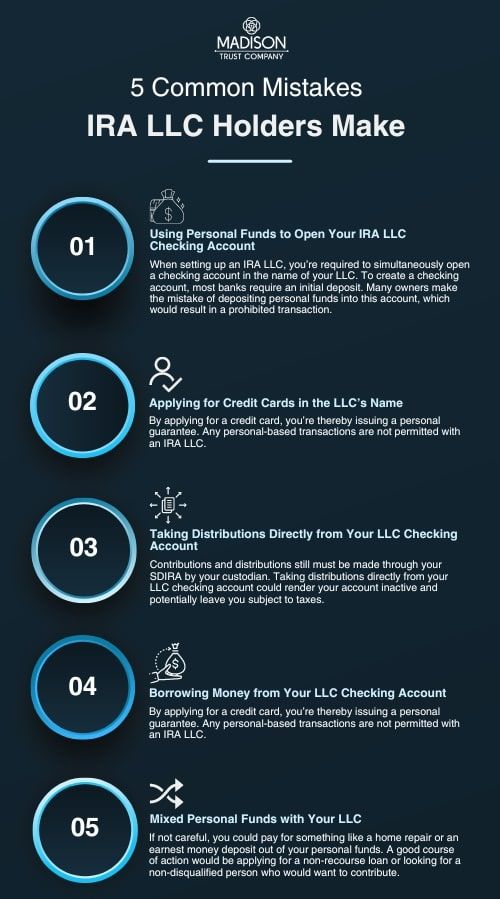7 Common Mistakes IRA LLC Holders Make and How to Avoid Them
Written By: Daniel Gleich
Key Points
- A Self-Directed IRA LLC offers greater control of investments but requires careful adherence to certain rules, such as avoiding personal fund use for LLC bank accounts and keeping personal and LLC finances separate.
- Common mistakes in managing an IRA LLC include applying for credit cards under the LLC, and improper handling of distributions and borrowing from the LLC account.
- Effective management of an IRA LLC involves detailed record-keeping, consulting with your custodian for fund transfers between qualified accounts, and understanding regulations to avoid tax penalties and maintain the account's eligible status.

A Self-Directed IRA (SDIRA) allows you to select and manage your own alternative investments beyond Wall Street products. Establishing an IRA LLC increases your control even more by letting you manage everyday investment transactions without involving your Self-Directed IRA custodian.
However, the increased control of an IRA LLC comes with added responsibility. In this guide, we'll discuss seven mistakes commonly made by IRA LLC holders and how to avoid them.
1. Using Personal Funds to Open an LLC Bank Account

When setting up an IRA LLC to gain checkbook control of your SDIRA, you will open a dedicated checking account for the LLC. The bank often asks for an initial deposit, and many owners make the mistake of depositing personal funds. To keep your account in compliance with IRS regulations for IRA LLCs, it’s important to avoid adding personal funds to the account.
If your selected bank for establishing an LLC checking account requires a minimum deposit to open the account, you cannot use personal funds to fulfill the requirement. Instead, request an Investment Authorization as a check and open your bank account with your investment check. You may also borrow funds from a non-disqualified party. Learn more about disqualified parties.
2. Applying for Credit Cards in Your LLC’s Name
Applying for credit cards under your LLC's name may seem advantageous, but it’s prohibited. Credit card companies send flyers en masse to new businesses, so you may receive a mailer asking you to sign up for a credit card for your LLC. You might think this is allowed because you're using the LLC's name, but you would actually be introducing a personal guarantee, which is not allowed in a Self-Directed IRA.
3. Taking Distributions Directly from Your LLC Checking Account
IRA LLC owners sometimes forget that their LLC is merely an asset of the IRA, not the IRA itself. For example, you may have a Self-Directed IRA through Madison Trust and an IRS-compliant LLC established through our sister company, Broad Financial. This entity held within your IRA gives you checkbook control, allowing you to handle routine business directly.
All contributions and distributions still must flow directly to your Madison Trust SDIRA custodian and then into your Self-Directed IRA account. Taking distributions directly from your checking account could cause your SDIRA to be dissolved and result in tax penalties.

4. Borrowing Money from Your LLC Checking Account

Just as you can't personally contribute or withdraw funds directly from the LLC checking account, you also can’t borrow money from it. Borrowing from your IRA LLC would result in a prohibited transaction.
This error can happen innocently enough, especially if you are used to moving money across multiple bank accounts. Just remember that your IRA LLC can't address personal cash flow concerns unless you're ready to take a distribution from your Self-Directed IRA.
5. Mixing Your Personal Funds with Your LLC’s Funds
Mixing your personal funds with your LLC’s funds is one of the most common mistakes IRA LLC holders make. It's an easy mistake to fall into and can even seem necessary at times.
Let's say your IRA has $150,000, and you purchase property for $120,000. You then spend $25,000 on repairs and eventually find a tenant. If a pipe breaks and causes $10,000 worth of damage, paying for the repair out of your personal account might be tempting. After all, your IRA LLC only has $5,000 left; half of what you need for a critical repair.
Unfortunately, paying with personal funds is still considered a prohibited transaction. Possible options in this scenario are to obtain a non-recourse loan or potentially find a non-disqualified investor to contribute to the cost of the repair.

6. Moving Funds Between Qualified Accounts Without Consulting Your IRA Custodian
If you have multiple IRAs, it's important to keep them separate and consult your SDIRA custodian first before moving funds between them. For example, suppose you have a Self-Directed Roth IRA with Madison Trust and a standard IRA at another institution. In that case, it's important to go through your custodian to transfer money between the accounts. This includes transfers and rollovers. Alerting your custodian ensures proper reporting and avoids potential issues with the IRS.
7. Inaccurate Record-Keeping

Any time you're handling personal funds or investments, it’s considered best practice to keep thorough records. This is especially true when it comes to Self-Directed IRA LLCs.
Consider keeping all documents related to your LLC investments in a designated file or folder. Hold on to receipts, bank statements, account details, and any communication between the LLC and other parties.
Maintaining thorough records helps you stay organized and on top of your funds. Checkbook control lets you place investments with no other signature needed, so your Self-Directed IRA custodian won't have a list of your assets.
If you need clarification on what records you should keep, it’s seen as wise to consult a tax professional or financial advisor. It's better to have too much documentation than not enough.
Overall, it's essential to understand the rules and regulations surrounding Self-Directed IRA LLCs before enacting any investment decisions. Knowledge is power.

Are you considering opening an IRA LLC? Contact Madison Trust or our sister company, Broad Financial, for more information and assistance. Our team is here to help you navigate the world of Self-Directed IRAs so you can enjoy the freedom of alternative investing and go forward with confidence.










